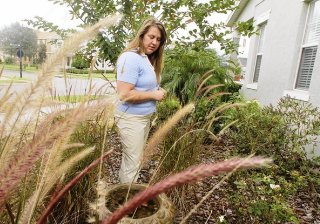|
Article Courtesy of The Orlando Sentinel By Kevin Spear Published October 9, 2012
A homeowner near Windermere who happens to work for Orange County's environmental department has been sued by her neighborhood association for replacing her thirsty grass with a water-conserving landscape.
Renee Parker's plants attract butterflies, blossom regularly in multiple colors and have an assortment of shapes and heights. For a meandering border, she planted Argentine bahia, a grass that's hardier than the water-craving, fertilizer-loving St. Augustine variety commonly growing in Florida yards.
What all things rooted in Parker's yard must have in common is the ability to survive without getting a drop of water from a sprinkler or hose — and she has the utility bills as proof. Last month's irrigation charge was for the base fee only: $3.33.
state residents from carefree irrigation of lawns and landscaping. Even today, nearly half of all residential water is used on landscaping, and the tainted runoff from fertilized lawns is a key factor in the declining health of the state's springs, rivers and lakes. Florida lawmakers passed a law in the early 2000s and another, more forceful one in 2009 with the goal of encouraging homeowners and community associations to cultivate landscapes that don't require coddling with sprinklers and chemicals. But the Summerport homes where Parker lives, while relatively new, feature strikingly lush lawns. And the lawsuit refers to association rules, including this one: "All sod must be St. Augustine grass and will be required on all landscape portions of front, rear and side yard." The association's president, Barbara Proto, said Friday that a few Summerport yards have been retrofitted to be more environmentally friendly, but no lawns in the community are allowed to have bahia grass, which has thinner, sparser blades than the St. Augustine variety. The lawsuit warns that Parker's new landscaping "will encourage other property owners to violate" the community's landscaping rules. Summerport's lawyer did not return calls seeking comment on the suit. Parker said she had difficulty with the St. Augustine lawn planted by her builder as soon as she moved into her home. Much of her yard is along the south side of her home, which faces the full brunt of afternoon sun. Also, her lot is elevated, so even after a heavy rainfall, her yard is dry again in an hour. She said that keeping her St. Augustine lawn alive was a labor of disappointments that resulted in a patchwork of dead spots. Working at an environmental agency, and aware that lawns contribute significantly to water shortages and water pollution, Parker latched on to the 2009 state law encouraging Florida-friendly landscaping that seeks to save water and reduce usage of fertilizer and pesticides by "planting the right plant in the right place." The law also bars homeowner associations from interfering with residents who pursue such landscapes. Still, associations retained their authority to approve or reject lawn and yard modifications, and there are few specifics in the statute about what qualifies as a "right plant." Officials at both the University of Florida's Institute of Food and Agricultural Sciences, a primary promoter of Florida-friendly landscapes, and at the South Florida Water Management District, a key champion of water conservation, say disputes between homeowners and their community associations are on the rise — but lawsuits are still uncommon. Both the institute and the district avoid getting involved in such disputes. "We are educators, not lawyers," said Esen Momol, the institute's program director for Florida-friendly landscaping. The events and communications that led to Summerport suing Parker and her husband are somewhat unclear. In July of last year, she filed an application to redo her landscaping, attaching a survey of her property, a drawing of areas to be replanted and a list of the plants. But she said she got no response within the 30 days in which, according to her understanding of association rules, the community's review board must make a decision. Her landscape conversion was well under way by last October; in December, she got a letter from the association's lawyer, demanding that she submit an application. She wrote back to say that she already had but says she didn't get a response. Still, Parker said, she submitted another application. At that point, Parker suspended the remaking of her lawn; a little less than half is now Florida-friendly, while the rest is the patchy mess that results when St. Augustine grass isn't watered and fertilized regularly. Isamarie Rojas, the association's manager, said she's not sure why Parker didn't learn of a decision made by the association's review board to deny her application. "We want the community to look uniform, and she wanted something different," Rojas said. Parker doesn't think she can afford a lawyer, or even find one with relevant experience, to defend what she thinks is her right under the 2009 law. "What I've done is very Florida-friendly, and I don't see why they don't see that," she said. Charles Lee, vice president of advocacy for Audubon of Florida and a persistent campaigner for getting rid of thirsty lawns, said landscapes that need only rainfall to thrive should be a priority in Florida. "Homeowners like the Parker family should not be bullied by their homeowner's association for converting to Florida-friendly landscaping," Lee said. "Hopefully, someone from the water-management district or the Florida Attorney General's Office will intervene on their side." |
